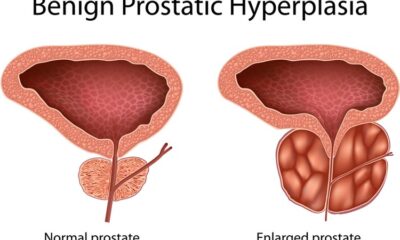Health
How to Treat Prostate Cancer

Prostate cancer is a common type of cancer in males, but it is highly treatable in the early stages. It begins in the prostate gland, which sits between the penis and the bladder.
The prostate has various functions. These include producing the fluid that nourishes and transports sperm, secreting prostate-specific antigen (PSA), a protein that helps semen retain its liquid state, and helping aid urine control.
Other than skin cancer, prostate cancer is about the most common kind of cancer affecting males in the United States. The American Cancer Society (ACS) predicts that in 2021 there will be around 248,530 new diagnoses of prostate cancer and approximately 34,130 deaths from this type of cancer.
Around 1 in 8 males will receive a diagnosis of prostate cancer at some point in their life. However, only 1 in 41 of these will die as a result. This is because treatment is effective, especially in the early stages. Routine screening enables doctors to detect many cases of prostate cancer before they spread.
Symptoms
There are often no symptoms during the early stages of prostate cancer, but screening can detect changes that may indicate cancer. Screening involves a test that measures levels of PSA in the blood. High levels suggest that cancer may be present.
Males who do experience symptoms may notice:
· difficulty starting and maintaining urination
· a frequent urge to urinate, especially at night
· a weak urine stream
· blood in the urine or semen
· painful urination or ejaculation
· pain in the back, hips, or pelvis
Advanced symptoms
People with advanced prostate cancer may also show no symptoms. Potential signs will depend on the size of the cancer and where it has spread in the body. In addition to the above, advanced prostate cancer can involve the following symptoms:
Treatment will depend on the cancer stage, among other factors, such as the Gleason score and PSA levels. It is also worth noting that many treatment options may be applicable, regardless of the stage of cancer.
In the sections below, we list some treatment options trusted sources for prostate cancer and explore what treatment may mean for fertility.
Early stage prostate cancer
If the cancer is small and localized, a doctor may recommend:
Watchful waiting or monitoring
The doctor may check PSA blood levels regularly but take no immediate action. Prostate cancer grows slowly, and the risk of treatment side effects may outweigh the need for immediate treatment.
Surgery
A surgeon may carry out a radical prostatectomy to remove the tumor. In addition to removing the prostate, the procedure may also involve the removal of the surrounding tissue, seminal vesicles, and nearby lymph nodes. A doctor can perform this procedure using either open, laparoscopic, or robot-assisted laparoscopic surgery.
Radiation therapy
This uses radiation to kill cancer cells or prevent them from growing. Options for early-stage prostate cancer may include:
External radiation therapy: This method uses a machine outside the body to send radiation toward the cancer cells. Conformal radiation therapy is a type of external radiation that uses a computer to help guide and target a specific area, minimizing the risk to healthy tissue and allowing a high dose of radiation to reach the prostate tumor.
Internal radiation therapy: Also known as brachytherapy, this method uses radioactive seeds that a doctor implants near the prostate. A surgeon uses imaging scans, such as ultrasound or computed tomography to help guide the placement of the radioactive substance.
Treatment will depend on various factors. A doctor will discuss the best option for the individual.
Advanced Prostate Cancer
As cancer grows, it can spread throughout the body. If it spreads, or if it comes back after remission, treatment options will change. Options can include:
Chemotherapy: This option uses drugs to help stop the growth of cancer cells. While it can kill cancer cells around the body, it may cause adverse effects.
Hormonal therapy: Androgens are male hormones. The main androgens are testosterone and dihydrotestosterone. Blocking or reducing trusted sources these hormones appear to stop or delay the growth of cancer cells. One option is to undergo surgery to remove the testicles, which produce most of the body’s hormones. Various drugs can also help.
· Immunotherapy: This method uses a person’s immune system to help fight cancer. Scientists can use substances the body produces, or create them in a lab, to help boost or restore the body’s natural defenses against cancer.
· Targeted therapy: This method uses drugs or other substances that identify and attack specific cancer cells.
Effects on fertility
The prostate gland plays a role in sexual reproduction. Prostate cancer and many of its treatments affect fertility in several ways.
For example, surgery to remove either the prostate gland or the testicles will affect semen production and fertility. Also, radiation therapy can affect prostate tissue, damaging sperm and reducing the amount of semen for transporting it. Hormonal treatment can also affect fertility.
However, some options for preserving these functions include banking sperm before surgery or extracting sperm directly from the testicles for artificial insemination.
There is no guarantee that fertility will remain intact after treatment for prostate cancer. Anyone who would like to have children after treatment should discuss fertility options with their doctor when they devise their treatment plan.
Researchers are unsure of the exact cause of prostate cancer. It develops when specific changes occur, usually in glandular cells. When prostate gland cells appear abnormal, a doctor may refer to these changes as prostatic intraepithelial neoplasia (PIN). Nearly 50% trusted source of all males over the age of 50 years have PIN.
At first, the changes will be slow, and the cells will not be cancerous. However, they can become cancerous with time. Cancer cells can be high or low grade. High-grade cells are more likely to grow and spread, while low-grade cells are not likely to grow and are not a cause for concern.
Send Us A Press Statement Advertise With Us Contact Us
And For More Nigerian News Visit GWG.NG






